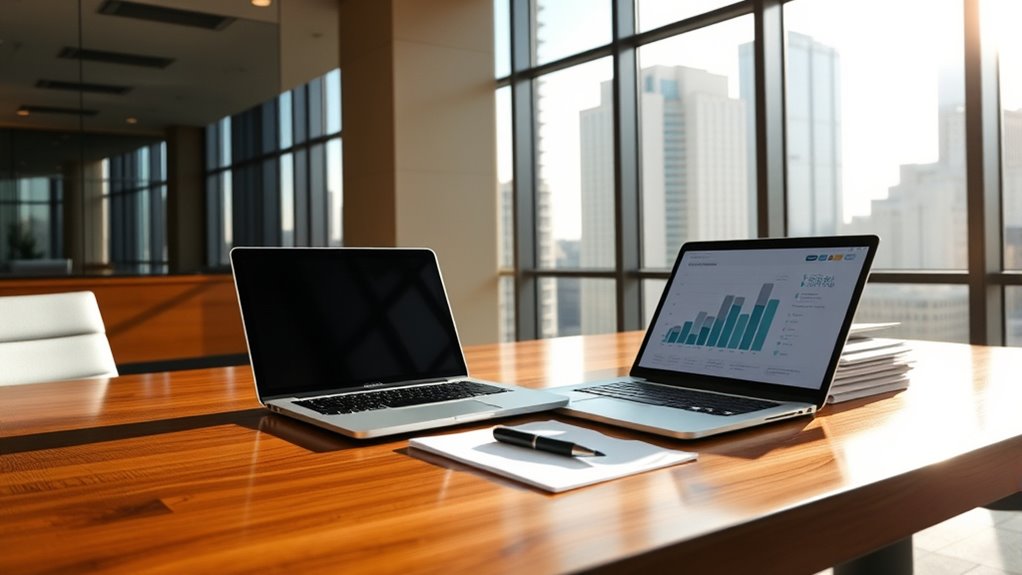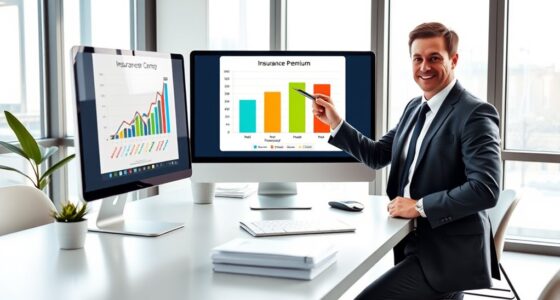Leasing business equipment offers you notable tax benefits and cost advantages. You can often fully deduct lease payments as business expenses, giving you immediate tax relief. Plus, leasing helps you stay current by easily upgrading to newer equipment and avoids obsolescence worries. You may also qualify for additional tax credits, especially for energy-efficient investments. With predictable payments, leasing improves cash flow and simplifies financial planning. Keep exploring to uncover even more ways leasing can boost your business’s financial health.
Key Takeaways
- Lease payments are fully deductible as business expenses, providing immediate tax relief.
- Leasing simplifies tax planning by allowing the write-off of entire lease costs in the year incurred.
- Equipment leasing may qualify for additional tax credits, especially for energy-efficient or eco-friendly equipment.
- Leasing helps reduce taxable income and enhances cash flow through predictable monthly payments.
- It allows businesses to upgrade equipment regularly, avoiding depreciation limitations and maximizing tax benefits.

Leasing business equipment can be a smart financial move, especially when you take advantage of available tax breaks. One of the key benefits of leasing is the potential to access attractive lease incentives offered by equipment manufacturers or leasing companies. These incentives may include reduced upfront costs, lower interest rates, or special lease terms designed to make acquiring new equipment more affordable. By negotiating these incentives, you can effectively lower your overall expenses and improve your cash flow, which is vital for maintaining operational flexibility. Additionally, lease incentives can sometimes be combined with other promotional offers, maximizing your savings and making leasing an even more appealing option.
Leasing equipment offers incentives like lower costs and better cash flow through manufacturer or leasing company deals.
Another important advantage of leasing is the depreciation benefits that come into play. When you lease rather than buy, you typically don’t have to worry about the complex depreciation schedules associated with purchasing equipment. Instead, the lease payments are often fully deductible as business expenses on your taxes. This means you can write off the entire lease amount in the year you incur it, providing immediate tax relief. This contrasts with purchasing equipment, where you might be limited to depreciation deductions spread out over several years, reducing your current year’s taxable income. The ability to deduct lease payments directly can considerably reduce your tax burden and improve your bottom line.
Furthermore, leasing allows you to keep your equipment up-to-date without the hassle of selling or disposing of outdated gear. When the lease term ends, you can simply return the equipment and lease newer, more advanced models. This flexibility ensures your business stays competitive and efficient without the added concern of equipment obsolescence. Plus, because lease agreements are often structured with predictable monthly payments, you gain clearer insight into your expenses, simplifying budgeting and financial planning.
It’s also worth noting that the tax benefits of leasing can extend beyond depreciation. Many lease agreements qualify for specific tax credits or incentives, especially for environmentally friendly or energy-efficient equipment. By choosing leased equipment that qualifies for such incentives, you can further reduce your overall costs and take advantage of government programs designed to promote sustainable business practices. Being aware of the available tax deductions can help you maximize your leasing advantages and improve your financial strategy.
Frequently Asked Questions
Can Leasing Equipment Improve My Business’S Cash Flow?
Leasing equipment can definitely improve your business’s cash flow by spreading out costs instead of a large upfront investment. This makes equipment upgrades more manageable and helps you maintain healthy cash flow management. You won’t tie up your capital in purchases, freeing funds for other priorities. Plus, leasing often includes maintenance, reducing unexpected expenses and ensuring your equipment stays current, supporting smoother operations and growth.
Are Lease Payments Fully Deductible for Tax Purposes?
Think of lease payments as planting seeds for your business’s growth. Usually, you can fully deduct these payments, like watering your crops, under lease accounting rules. However, the IRS might treat equipment differently with tax depreciation, which spreads deductions over time. Always check current tax laws, but generally, lease payments are deductible, helping you manage your expenses and boost your cash flow effectively.
How Does Leasing Affect My Company’s Balance Sheet?
When you consider lease accounting, leasing impacts your company’s balance sheet by adding a right-of-use asset and a lease liability. This means your assets and liabilities increase, reflecting your leasing commitments. Leasing can improve cash flow and provide flexibility, but it also affects financial ratios and borrowing capacity. Understanding the balance sheet impact helps you make informed decisions about leasing versus buying, ensuring your financial statements accurately represent your company’s obligations.
What Are the Risks of Leasing Versus Buying?
When weighing leasing versus buying, consider that a lease term might limit your flexibility if your needs change. Leasing usually doesn’t transfer ownership, so you’re stuck with payments but don’t gain asset value. Buying offers ownership transfer, giving you long-term benefits, but requires higher upfront costs and responsibility for maintenance. Decide based on your cash flow, long-term goals, and whether you prefer flexibility or asset ownership.
Can Leasing Help My Business Qualify for Other Tax Incentives?
Think of leasing as a key that can unfasten extra tax benefits for your business. Lease tax benefits often include deductions for equipment financing, which can lower your taxable income. By choosing leasing, you might qualify for additional incentives, such as accelerated depreciation or tax credits. This approach makes equipment more affordable and can improve your cash flow, helping your business grow faster while maximizing your tax advantages.
Conclusion
Now that you see the leasing advantages, it’s clear these tax breaks can be a game-changer for your business. Don’t let opportunities slip through your fingers—taking advantage of these incentives can really boost your bottom line. Remember, the early bird catches the worm, so act now to maximize your savings. By leveraging leasing options wisely, you’re setting yourself up for long-term success. Keep your eyes open and seize the moment before it’s gone.










